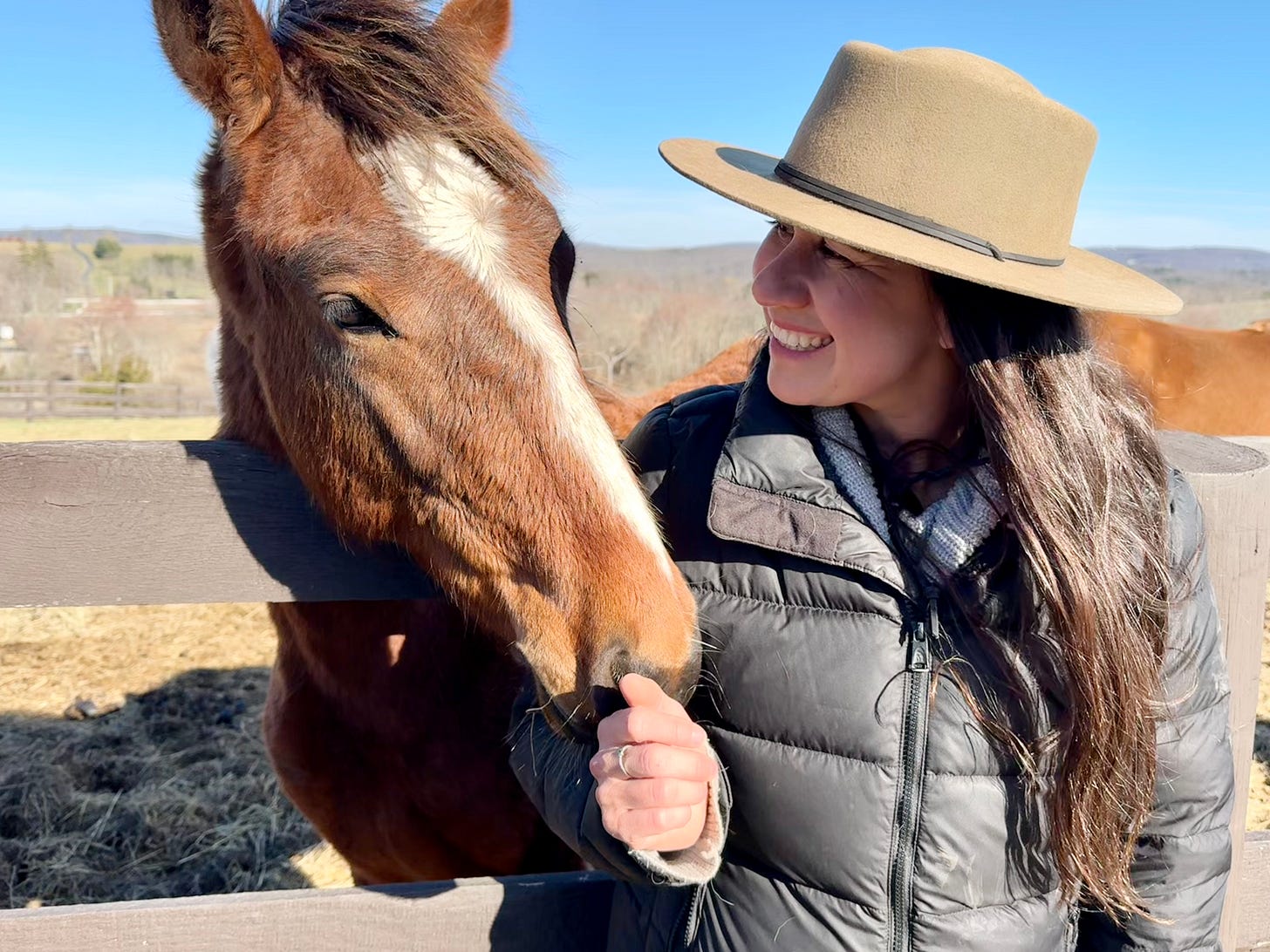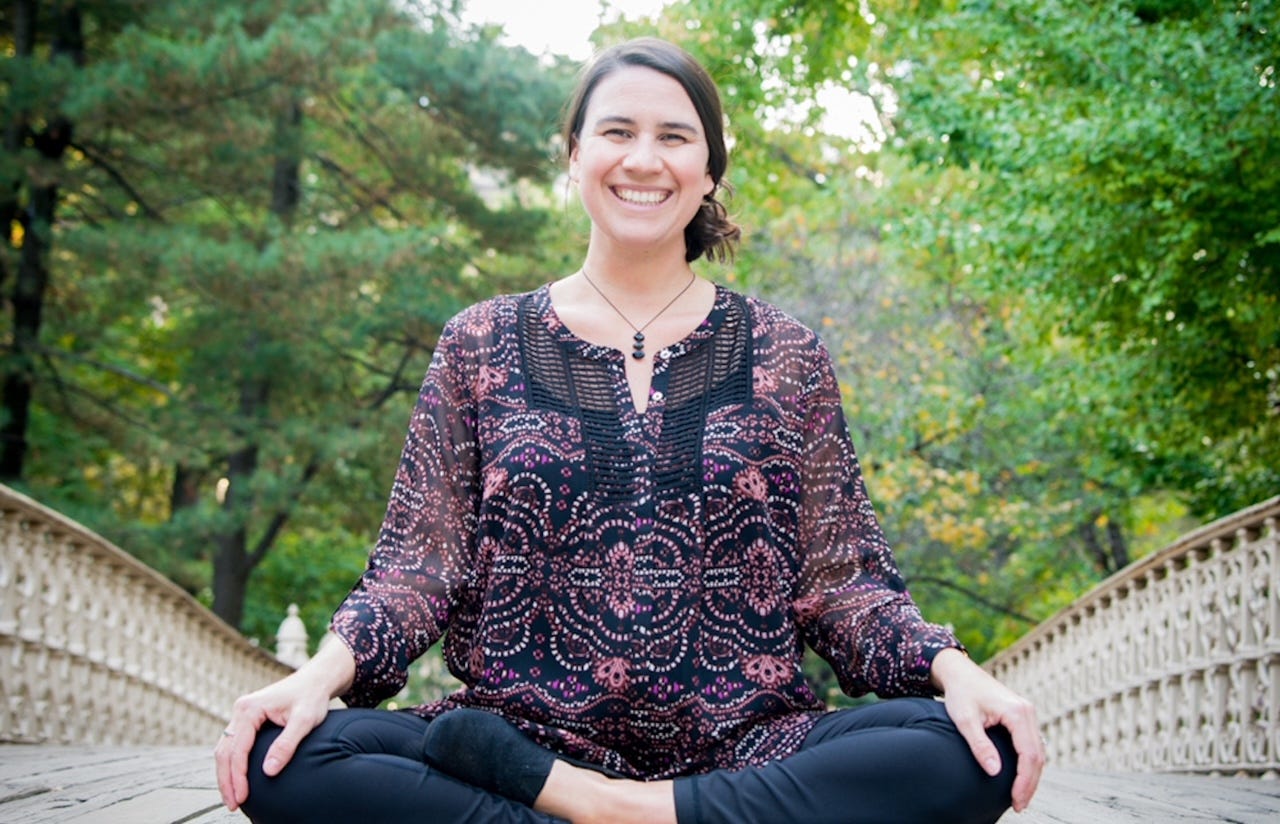Off the Page: Featuring Jennifer Cohen Harper
Conversations with Authors Exploring Writing as a Practice
LW: How is mindfulness with horses a healing practice?
JCH: For most hurts, a healthy relationship is the primary vehicle for healing. But because of human’s complex history of hurting each other, it’s often hard to find an entry point to explore what a healthy relationship looks and feels like. Often, we don’t even know what a healthy relationship with ourselves feels like.
Horses have evolved to live in meaningful, supportive, mutually beneficial relationships. Everyone’s needs are important, and everyone communicates authentically. Things get hard, but they trust themselves and each other. When fear or discomfort arise, they are quick to respond, but also quickly find their way back to standing in the sun. They recognize safety when it’s available, and rest in healthy connection to themselves, each other, and the world around them. And they are willing to practice this way of being with us.
Cultivating mindful awareness in relationship to horses can offer us a profound experience of attunement. Of mutuality. The experience of feeling seen, valued, and understood in a way that has nothing to do with our status, our stories, or our history. With horses, we can practice making requests and acknowledging our own needs with sentient beings who are masterful at staying connected to themselves while also connecting with others, who don’t avoid the temporary discomfort of truthfulness, and who don’t have any motivation (or capacity) to lie. Practicing mindfulness with horses offers a healthy relational dynamic that supports our capacity to heal. And for many, it is the bridge they need to move towards healthier relationships with humans, including themselves.
LW: How can time with horses support a writing practice?
JCH: It amazes me how practicing communication with horses supports my writing when writing is all words and horses are all body, breath, and energy.
But understanding horses requires us to slow down and listen for the essence of the thing. To take in the subtle messages and follow the threads, mix it all up with our intuition, filter out the bullshit, and trust what we’re receiving. Which, without the hard evidence of words, requires us to trust our sense of knowing. Then to communicate effectively we need to be clear and we need to be congruent.
For the horses to hear us, what we’re expressing on the outside needs to match what is happening on the inside. Lying is not an option. Faking it isn’t an option. And we get to practice editing because everything that isn’t essential is a distraction that creates confusion.
Time with horses helps me get to the heart of things in my own body and mind, helps me be more honest with myself, and helps me practice saying what needs to be said.
LW: What is the difference between “traditional writing” and “writing with a healing intention?
JCH: When I think of the writing in my life, there’s a clear difference between writing as a product, and writing as a practice. There’s the writing that’s done, and the writing that’s experienced. The writing that serves to explain or convince or justify or prove… and the writing that has been part of knowing myself, and being known. But the writing that has been the source of most healing has been the writing that was offered with the intention of feeling less alone, and of others feeling less alone. The writing that has said I’ll do the scary thing of being me, so it’s a little less scary for you to be you.
LW: What role does movement play in your writing life? Do you return to any somatic practices, mindfulness exercises, or other rituals before or after you write?
JCH: Practices of embodiment and awareness are a part of my life in a way that is inextricable from writing. The cultivation of curiosity and compassion towards my sensory experiences in the world, my understanding of what it means to be alive, and my capacity to trust myself in a culture that makes it easy to outsource our decisions are all rooted in practice.
My ability to hold on to my own narrative, in connection to my own lived experience, has sometimes been a challenge. As a daughter, a mother, a sister, a student, a teacher… I’ve had to learn to keep track of myself when there are so many other people to keep track of.
Without a personal practice centered on embodiment, I’m not sure whose stories I’d be telling.
I’ve learned many practices over the past 20 or so years. What I’ve come to understand is that to meaningfully engage with the present (and write about it), in a way that allows me to reflect on the past and imagine the future without overwhelm or stuckness, I need practices that help me do four things.
Orient to the world around me. Ground my energy and intentions. Release what is no longer needed. Connect to myself and with others with compassion. These are the same things I need to write in a way that feels authentic.
Some of my favorites are:
Orienting: Layers of Sounds / Layers of Observation
Grounding: Tracing My Feet / Heart and Belly Breath
Releasing: I take my cues from the horses these days - shaking it off, releasing breaths, and moving my body in whatever way feels right in the moment… less thinking more allowing
Connecting: Lovingkindness Meditation
LW: What role does meditation play in your creative life?
JCH: Clearing… remembering …
LW: Creating our unique Mindfulness with Horses & Narrative Healing Retreats at 13 Hands Equine Sanctuary in the Hudson Valley, has been one of the most meaningful highlights of my work. Can you share the benefits and inspiration behind this pairing and our upcoming retreat January 9-11 and forthcoming series?
JCH: How Narrative Healing and Mindfulness with Horses come together to support people is a little different for everyone, but the potency has been undeniable. With the support of the horses, participants have been able to find and feel parts of themselves that have been needing finding and feeling. In writing from this expanded and embodied sense of self, within a loving community, those parts are nurtured and witnessed; heard and honored. I’ve seen people connect with their joy, their power, and their creativity, but also connect in healthy ways to their anger and their fear. It’s been profound to witness and to experience.
LW: What book are you excited to read next?
I’m excited to read Joy Sullivan’s new book of poems, Instructions for Travelling West. The title poem ends with a line that surprised me, but also felt familiar, as it addresses something that’s come up in retreats. I’m looking forward to diving into the rest.
***
BOOK SPOTLIGHT:
THANK. YOU BREATH: FINDING PEACE AND POWER FROM THE INSIDE OUT by Jennifer Cohen Harper
“Thank You Breath is a must-have book for children to find gratitude for one of the body’s most foundational, yet complex and important, functions: breathing. Breathing underscores everything we do and has a massive impact on our mental health and well-being. Jennifer teaches the lesson with playful rhymes and whimsical illustrations, relaying relatable examples for children to experience the power of noticing their breath and to gain awareness of the various ways in which it supports them.”
—Christina Furnival, MS, LPCC, author of The Not-So-Friendly Friend and Fear Not!
Thank you Breath is available everywhere books are sold, and you can get your copy here. You can also sign up for classes with Jenn and learn more about her here.





